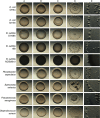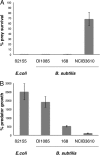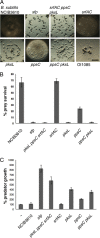Bacillaene and sporulation protect Bacillus subtilis from predation by Myxococcus xanthus
- PMID: 25002419
- PMCID: PMC4178607
- DOI: 10.1128/AEM.01621-14
Bacillaene and sporulation protect Bacillus subtilis from predation by Myxococcus xanthus
Abstract
Myxococcus xanthus and Bacillus subtilis are common soil-dwelling bacteria that produce a wide range of secondary metabolites and sporulate under nutrient-limiting conditions. Both organisms affect the composition and dynamics of microbial communities in the soil. However, M. xanthus is known to be a predator, while B. subtilis is not. A screen of various prey led to the finding that M. xanthus is capable of consuming laboratory strains of B. subtilis, while the ancestral strain, NCIB3610, was resistant to predation. Based in part on recent characterization of several strains of B. subtilis, we were able to determine that the pks gene cluster, which is required for production of bacillaene, is the major factor allowing B. subtilis NCIB3610 cells to resist predation by M. xanthus. Furthermore, purified bacillaene was added exogenously to domesticated strains, resulting in resistance to predation. Lastly, we found that M. xanthus is incapable of consuming B. subtilis spores even from laboratory strains, indicating the evolutionary fitness of sporulation as a survival strategy. Together, the results suggest that bacillaene inhibits M. xanthus predation, allowing sufficient time for development of B. subtilis spores.
Copyright © 2014, American Society for Microbiology. All Rights Reserved.
Figures





Similar articles
-
Predation by Myxococcus xanthus induces Bacillus subtilis to form spore-filled megastructures.Appl Environ Microbiol. 2015 Jan;81(1):203-10. doi: 10.1128/AEM.02448-14. Epub 2014 Oct 17. Appl Environ Microbiol. 2015. PMID: 25326308 Free PMC article.
-
Identification of Functions Affecting Predator-Prey Interactions between Myxococcus xanthus and Bacillus subtilis.J Bacteriol. 2016 Nov 18;198(24):3335-3344. doi: 10.1128/JB.00575-16. Print 2016 Dec 15. J Bacteriol. 2016. PMID: 27698086 Free PMC article.
-
Thiocillin contributes to the ecological fitness of Bacillus cereus ATCC 14579 during interspecies interactions with Myxococcus xanthus.Front Microbiol. 2023 Nov 24;14:1295262. doi: 10.3389/fmicb.2023.1295262. eCollection 2023. Front Microbiol. 2023. PMID: 38075900 Free PMC article.
-
The Genetics of Prey Susceptibility to Myxobacterial Predation: A Review, Including an Investigation into Pseudomonas aeruginosa Mutations Affecting Predation by Myxococcus xanthus.Microb Physiol. 2021;31(2):57-66. doi: 10.1159/000515546. Epub 2021 Apr 1. Microb Physiol. 2021. PMID: 33794538 Review.
-
Deciphering the hunting strategy of a bacterial wolfpack.FEMS Microbiol Rev. 2009 Sep;33(5):942-57. doi: 10.1111/j.1574-6976.2009.00185.x. Epub 2009 May 9. FEMS Microbiol Rev. 2009. PMID: 19519767 Free PMC article. Review.
Cited by
-
Mutations in genes encoding antibiotic substances increase the synthesis of poly-γ-glutamic acid in Bacillus amyloliquefaciens LL3.Microbiologyopen. 2017 Feb;6(1):e00398. doi: 10.1002/mbo3.398. Epub 2016 Aug 18. Microbiologyopen. 2017. PMID: 27539744 Free PMC article.
-
Genetic components of Escherichia coli involved in its complex prey-predator interaction with Myxococcus xanthus.Front Microbiol. 2023 Dec 5;14:1304874. doi: 10.3389/fmicb.2023.1304874. eCollection 2023. Front Microbiol. 2023. PMID: 38116529 Free PMC article.
-
Bacillus lipopeptide-mediated biocontrol of peanut stem rot caused by Athelia rolfsii.Front Plant Sci. 2023 Feb 20;14:1069971. doi: 10.3389/fpls.2023.1069971. eCollection 2023. Front Plant Sci. 2023. PMID: 36890892 Free PMC article.
-
Effects of Bacillus cereus Endospores on Free-Living Protist Growth.Microb Ecol. 2017 Apr;73(3):699-709. doi: 10.1007/s00248-016-0905-7. Epub 2016 Dec 7. Microb Ecol. 2017. PMID: 27928597
-
Predatory Strategies of Myxococcus xanthus: Prey Susceptibility to OMVs and Moonlighting Enzymes.Microorganisms. 2023 Mar 29;11(4):874. doi: 10.3390/microorganisms11040874. Microorganisms. 2023. PMID: 37110297 Free PMC article.
References
Publication types
MeSH terms
Substances
Grants and funding
LinkOut - more resources
Full Text Sources
Other Literature Sources
Molecular Biology Databases
Miscellaneous

